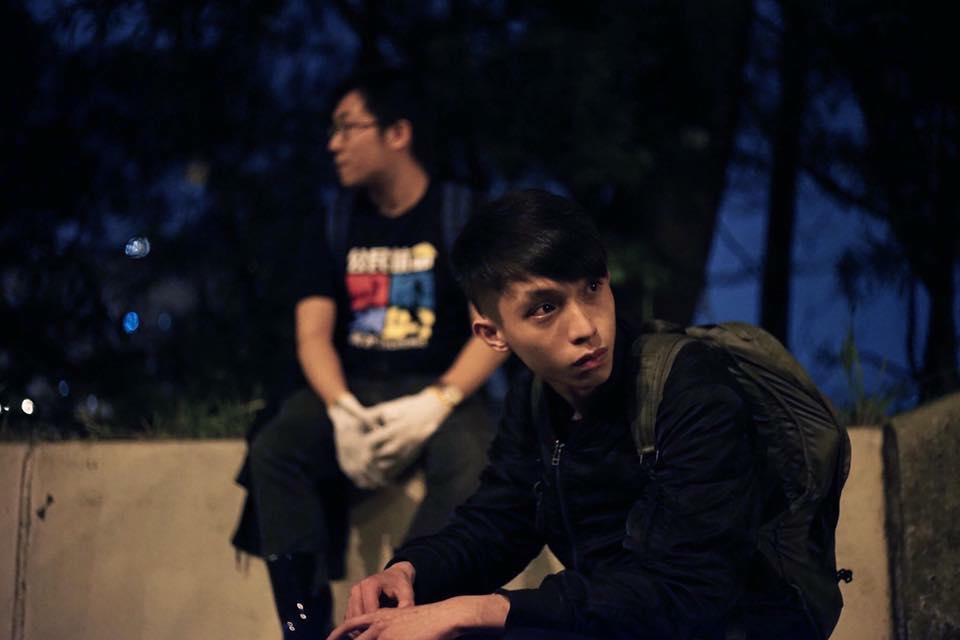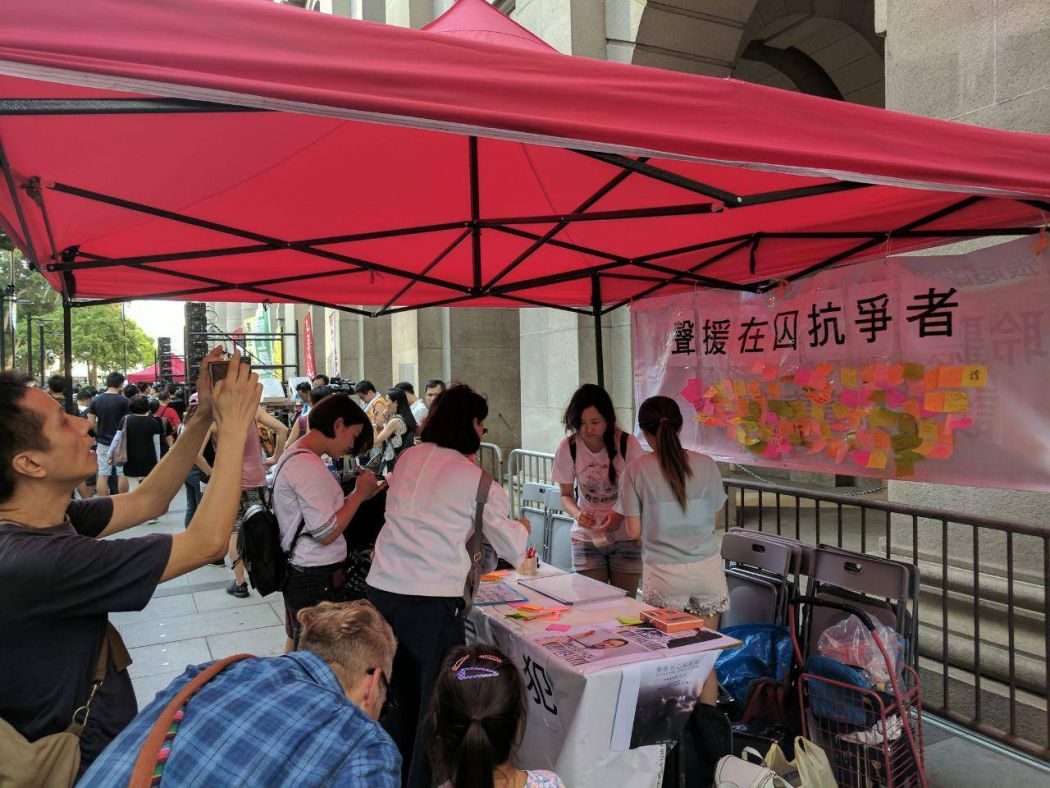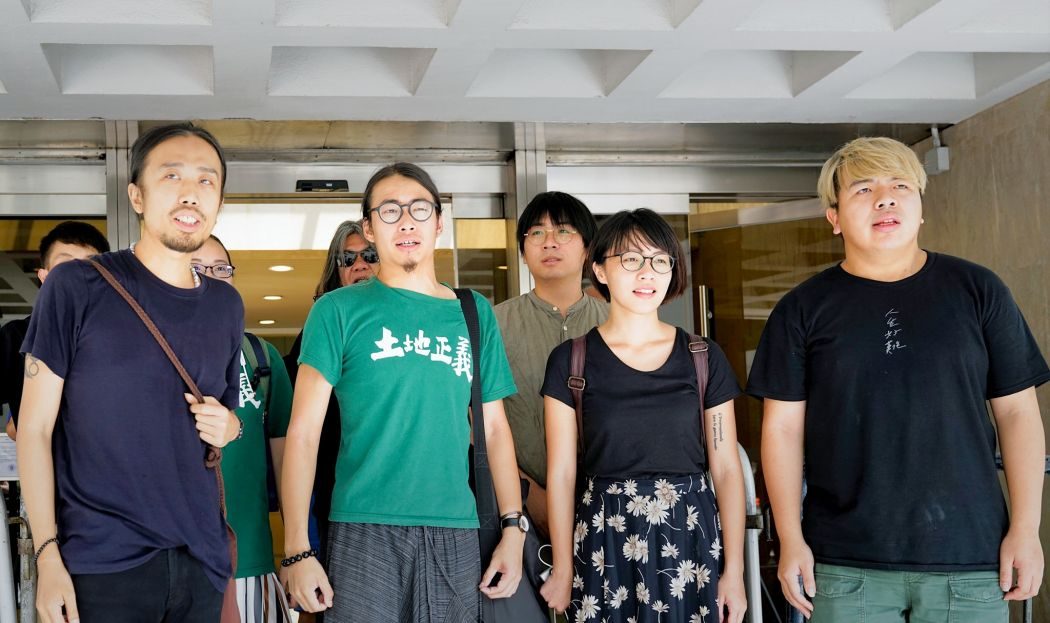“When Nathan was arrested at Civic Square, I was beside him. He told me: ‘No need to panic. It will be fine.’ When he was sentenced to imprisonment today, he [still] reassured me, ‘Don’t worry. Take care.’ He was, in fact, the one [in trouble], but he would always comfort people around him first.”
– Shek Pui-yin, ex-member of the Hong Kong Federation of Students and friend of Nathan Law, who was sentenced to eight months last Thursday over the Civic Square clash.

“Raphael, what is it like behind bars? Is it different from what you’ve imagined? This time, you might be serving a jail sentence for up to two years. I wonder how you feel – but I surely feel bad outside the bars. You asked us not to fuss, but how would you expect anyone with feelings not to do so?”
– the League of Social Democrats’ Figo Chan to Raphael Wong, sentenced to 13 months last Tuesday for taking part in the New Territories development protests.

“As I put down these words, I have not yet come to know the sentencing of Joshua and Nathan. I hope theirs would not be as long as mine, but we all know those remain free outside the jail would have a really tough time… [P]lease do not worry about us and hold firm to your belief and determination.”
– Demosisto’s Ivan Lam – writing from jail. He was sentenced to 13 months over the New Territories protests.
“He is an incredibly kind ‘[Hong Kong] kid’, he is a person who feels strongly and who has a strong sense of justice. He would always remind me that, if someone did something bad to me, I should learn how to dislike them, to avoid getting hurt myself. He always said that I had a bad temper, and would always scold me for getting angry, he would always say that I had a ‘resting bitch face’ – but at the same time, he was the person who gave me the most support when I was unhappy.”
– Lily Wong, friend of David Chu, handed a 13 month jail term over the New Territories protests.
Over the past week, an array of personal passages about the city’s recently jailed activists have inundated the Facebook feeds of Hongkongers. They presented the activists in a very different light from the chanting, fence-climbing youngsters described by the government, courts and media.
These fragments, written by the friends and families of the jailed activists – and, at times, even the imprisoned protesters themselves – are excerpts from the Story of the Frontiers project. Their Facebook page quickly amassed a following of over 10,000 fans within a week, with assistance from Translators for Dialogue in HK, which provides English versions of the dispatches.
They use the acronym SOFT, as they wish to present softer, more intimate stories to offer a human touch to the experiences of the frontline activists and their families: “This is an angle that hasn’t been explored much yet – how to present them as three-dimensional human beings. Without this knowledge, it’s very easy for others to demonise them,” a Story of the Frontiers member told HKFP.

The scope of the group’s work extends far beyond publishing posts on social media. They are, first and foremost, a support group for the “political prisoners” or those soon to face trial.
This includes not just the 16 from last week, but also those involved in last year’s Mong Kok unrest, the 2014 Occupy protests, the demonstrations outside the China Liaison Office last November in response to the National People’s Congress Standing Committee interpretation of the Basic Law, and more. At the last count, their list included 117 names.
“We were thinking: if all of you are jailed, then who else is left to support you? …[W]e’re the ones left standing here, and we wondered: what can we do from outside?”
The group formed around May, after the first sentences for the Mong Kok protesters were handed down. Its members and volunteers are from diverse backgrounds – social work, law, journalism, ex-members of the Hong Kong Federation of Students, and so on – many of them knew the activists personally, and most wish to remain anonymous.
Concerned that other support groups appear to be engaging in activities that may not necessarily be in the best interests of the defendants – even if their hearts were in the right place – the founding members decided to launch their own organised, systematic effort. They also provided additional assistance to existing groups, such as the Protect Northeast Campaign, which currently has three volunteers looking after 16 jailed activists and their families.

“We don’t take sides, and we don’t look at political inclinations [of the jailed activists] – if they need assistance, we will provide them with it,” the member said.
The core of their work is to provide support to the jailed protesters and the people around them, so that they will not feel alone, and will be mentally prepared for what is to come. This includes staying in close contact with some of the lawyers of the activists facing legal action, such as Jonathan Man. Visits from lawyers do not count towards inmate’s limited visiting hours, so it made it easier for simple messages to go back and forth between the prisoners and the group.
They also seek to provide accurate information on matters such as visiting hours in prison facilities. Although visiting periods under the Correctional Services Department are usually limited to two 30-minute slots per month, the group discovered that prisoners are allowed to ask for a two-slot extension, reserved for immediate family members.

“A lot of people don’t actually know this, and often the families apply for the initial slots because they are anxious and concerned. But then their friends and romantic partners never get to see them.”
They are also working to bring social workers and psychologists into their support network, so that they can provide assistance for families of those jailed, as well as those facing trial.
Currently, the group said, they have already involved activist and social worker Ken Tsang, and are coordinating a team of around 16 social workers. They are also attempting to introduce religious support as well as free counselling and psychological services: “For those who are facing trial, there is huge pressure, especially with the legal procedures and delays. It feels like a knife is hanging over their heads, while their families also have a range of concerns.”
This group says such assistance is especially helpful for activists who are less famous, as there may not be a host of people lining up to offer help, unlike with the case of the more-prominent Occupy trio. “If they send us a message us, we will respond as soon as we can and put someone on the case over the next one or two days.”

And what can the public do to support these activists? The group urged Hong Kong people to write letters to them, noting that there is a programme on RTHK Radio 1 every Sunday evening which reads out letters to prisoners. In Taiwan, human rights groups have launched initiatives to mail postcards to the activists in Hong Kong.
“It’s a very meaningful interaction, even if the postcards may not reach them immediately and are stashed together with the prisoners’ other personal belongings. Because, if they send hundreds, there may be one that eventually makes its way in. And even if they can’t receive them, the Correctional Services Department officer is required to call them into an office and notify them every time they have been mailed something. They would have to do this over and over again.”
The group said the public should not hesitate in doing the same. “It doesn’t have to be especially touching or poetic – it can be something as simple as recording your observations or relaying something you see in the news. It’s the quiet persistence of writing that counts.”
